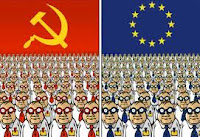
The 10 countries identified as imbalanced by the EC are Belgium, Bulgaria, Denmark, Italy, Malta, the Netherlands, Finland, Sweden and the UK.
Belgium:
Macroeconomic developments in the areas of external competitiveness of goods, and indebtedness, especially concerning the implications of the
high level of public debt for the real economy, continue to deserve attention.
More specifically, Belgium has experienced a long-term decline in its export market shares due to persistent losses in both cost and non-cost competitiveness.
While Belgian goods exports are gradually being reoriented towards more dynamic regions, the specialization in cost-sensitive intermediate products is intensifying...
Bulgaria
The impact of deleveraging in the corporate sector as well as the
continuous adjustment of external positions, competitiveness and labour markets deserve continued attention.
More specifically, Bulgaria rapidly built up imbalances during the boom phase that coincided with its accession to the European Union. In a context of catching up, high foreign capital inflows contributed to the overheating of the domestic economy and a booming housing sector.
Denmark
The continuing adjustment in the housing market and the high
level of indebtedness in the household and private sector as well as drivers of external competitiveness, deserve continued attention.
More specifically, there has been a weak export performance linked to a rise in unit labour costs due to high wage growth and, in particular, weak productivity growth.
Italy
Export performance and the underlying loss of competitiveness as
well as high public indebtedness in an environment of subdued growth deserve continued attention in a broad reform agenda in order to reduce the risk of adverse effects on the functioning of the Italian economy and of the Economic and Monetary Union, notably given the size of the Italian economy.
More specifically, in a context of elevated risk aversion in financial markets, Italy's high public debt weighs on the country's growth prospects through several channels, in particular the high tax burden needed to service the debt, funding pressures for Italian banks and thus for the private sector, increased macroeconomic uncertainty and a severely limited margin for countercyclical fiscal policies and growth-enhancing public expenditure.
Hungary
On-going adjustment of the highly negative net
international investment position, largely driven by private sector deleveraging in a context of high public debt and a weak business environment continue to deserve very close attention so as to reduce the important risks of adverse effects on the functioning of the economy.
Malta
The long-term sustainability of the public finances warrants attention
while the very large financial sector, and in particular, the strong link between the domestically-oriented banks and the property market poses challenges for financial stability and deserves continued monitoring.
More specifically, the long-term sustainability of public finances is at risk due to the high projected cost of ageing and other sizeable contingent liabilities.
The Netherlands
Macroeconomic developments regarding private sector debt and deleveraging pressures, also coupled with remaining inefficiencies in the
housing market deserve attention.
Although the large current account surplus does not raise risks similar to large deficits, the Commission will also continue monitoring the developments of the current account in the Netherlands.
More specifically, rigidities and distortive incentives have built up over decades to shape house financing and sectorial savings patterns.
Finland
The substantial deterioration in the current account position and the weak
export performance, driven by industrial restructuring, as well as cost and non-cost competitiveness factors, deserve continued attention.
More specifically, the loss in competitiveness weakens the country's economic position and risks compromising future prosperity and living standards, especially as population ageing already poses a challenge in this regard.
Finland has rapidly lost world market shares and the current account balance has been on a downward trend, and even turned into a deficit in 2011, which is forecast to widen.
Sweden
Macroeconomic developments regarding private sector debt and
deleveraging, coupled with remaining inefficiencies in the housing market deserve continued attention.
Although the large current account surplus does not raise risks similar to large deficits in other countries, the Commission will continue to monitor developments of the current account in Sweden.
The UK
Macroeconomic developments in the areas of household debt, linked to the high levels of mortgage debt and the characteristics of the housing market, as well as unfavourable developments in external competitiveness, especially as regards goods exports and weak productivity growth, continue to deserve attention.
More specifically, the UK faces tensions between the needs for deleveraging, maintaining financial stability and avoiding compromising investment and growth
 Spain's banking crisis wiped out billions of euros of family savings on Tuesday as small investors who bought shares in the nationalized giant Bankia were finally able to trade them – but at only a fifth of their original price. The wipeout on Madrid's stock exchange means that Bankia, which was created by the fusion of seven savings banks, has now lost 99% of its stock exchange value since it was listed 22 months ago. Preference share owners had been given the tradable shares, which came with a hefty haircut, as part of a cash injection worth billions of euros into the bank that wreaked most damage on Spain's financial system after suffering huge losses on toxic loans to real estate developers. Bankia's 11bn new shares, part of a €15.5bn (£13.3bn) recapitalization, tumbled as soon as they started trading on Tuesday morning. By the end of the day they were worth half their €1 book value. Trading in the new shares was meant to have marked a new start for the country's fourth-largest bank by market capitalization. Last year it needed a €24bn bailout as part of a wider European rescue of Spain's financial system.
Spain's banking crisis wiped out billions of euros of family savings on Tuesday as small investors who bought shares in the nationalized giant Bankia were finally able to trade them – but at only a fifth of their original price. The wipeout on Madrid's stock exchange means that Bankia, which was created by the fusion of seven savings banks, has now lost 99% of its stock exchange value since it was listed 22 months ago. Preference share owners had been given the tradable shares, which came with a hefty haircut, as part of a cash injection worth billions of euros into the bank that wreaked most damage on Spain's financial system after suffering huge losses on toxic loans to real estate developers. Bankia's 11bn new shares, part of a €15.5bn (£13.3bn) recapitalization, tumbled as soon as they started trading on Tuesday morning. By the end of the day they were worth half their €1 book value. Trading in the new shares was meant to have marked a new start for the country's fourth-largest bank by market capitalization. Last year it needed a €24bn bailout as part of a wider European rescue of Spain's financial system.


















UK EUROPEAN MEMBERSHIP - We don't want to be part of a United Europe governed by a socialist unelected junta from Brussels. Put the business case to one side, this is about democracy, liberty and self governance. I would rather be a little bit poorer now but in charge of my own destiny, than ruled by a socialist political elite which will in time become even more corrupt than now and make me much poorer in the long run. If the rest of Europe want to unite under a Brussels government then let them, but we don't want it. I suspect if other countries were ever given a vote, they would not want it either. But surprise, surprise, the unelected elites don't like elections because they get the wrong answer to their ever closer union. The business leaders quoted should know better than to neglect democracy for the sake of profits....
Whilst the economic benefits of membership may, or may not be, overwhelming, (and Lord Lawson, Denis Healey and others have already questioned whether the economic benefits are as great as made out), that is not the issue. The issue is that there are a number of fundamental problems with the eurozone and the EU itself which are precipitating the continent into potential conflict. Firstly, as is apparent from Greece, Cyprus, Spain, Italy and Portugal, not a single person in those countries has a vote to change let alone influence policy being directed by Brussels. This democratic deficit in a time when the Euro-"elite" are pushing a solitary austerity agenda, without regard to the consequences of those policies not just on families and communities but half the continent, is fanning the flames of extreme nationalism in those countries. Until such time as the people of Europe get a vote to get rid of the idiots in charge in Brussels, we should have nothing to do with it. Secondly, even if the policy of "internal devaluation" is successful, that will mean a worker in those countries will have to work harder and longer for a Euro than a worker, say, in Germany. So the exodus of the youth from those countries will accelerate and some will go within the Union to areas where there is work. This will drive down wages in the destination countries and will ignite talk of "jonny foreigner taking our jobs" that we've heard incessantly here. How well that will play in Germany is anyone's guess. Thirdly, the accounts of the EU haven't been signed off by their auditors for, I believe, something like 10 years due to fraud and misappropriation of funds. Finally, and most importantly, if the eurozone members are successful in driving through a Federal State (without obtaining specific consent for this from the individual national electorates), what impact is that going to have upon the operation of the EU? Currently, we have 27 nations, some with greater weight than others. With a Federal State of 17 nations, that bloc will outvote and outweigh all the other members. Policy (as the SNP seems to argue) will be set to the agenda of the bigger constituent. Ergo, the UK and all the other non-eurozone members will be outvoted on every measure, and what guarantees are there going to be to protect those countries from such policy focus? Given the EU's declaration of economic war against the City of London with the FTT (stealing money that would otherwise go to the UK Exchequer from the City), capping bonuses (bureaucracy gone mad and aimed directly at the City), with seemingly precious little the UK can do about it, it does not augur well for future protection. I remain unconvinced about the economic benefits of membership. The EU will want access to our market. But is the EU necessarily the dynamic growth zone for the future? It doesn't look like it. However, the risk of extreme nationalism arising from the current policies and the utter devastation being wrought across half a continent to "save" the Euro is not a price worth paying to secure economic benefits. We should be leading Europe away from the precipice towards which its bureaucrats appear determined to push it. Clearly this isn't happening at present, so its time to leave. Not, as some would suggest, to a Norwegian or Swiss style semi-detached model, but complete detachment. And the sooner the better.